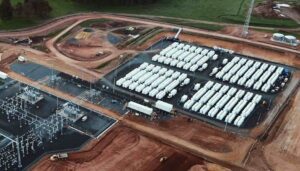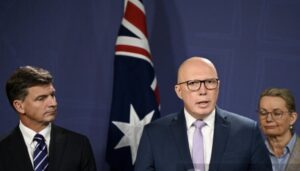Nearly 200 ministers have arrived in Paris to bargain and negotiate over the final 20 pages of text, and the 290 or so brackets that remain – the outcome of which will decide whether this agreement will fulfil its ambitions, or be full of empty rhetoric.
Australia foreign minister Julie Bishop arrived, delivered her speech to the plenary, and promised …. $625,000 on promoting the interests of women in climate-related decision-making processes.
If that seemed a little underwhelming, so did the rest of the speech.
Typically of the Australian government at these talks, it was fine on rhetoric – particularly about prime minister Malcolm Turnbull’s innovation plan (this government has edited its slogans down from three words to a single word, innovation) but short on action, particularly on climate and clean energy, using the technologies already available.
Bishop told the plenary that Australia is “transforming the way we produce electricity”, but the data shows coal-fired generation is rising, thanks to the repeal of the carbon price and the halt in renewable energy investment thanks to the Coalition fiddling with previously agreed policies.
RenewEconomy asked the minister later if the government was worried that the government’s policies were having the opposite effect of their stated intention. There was more talk of the renewable energy target, and the doubling of the rate of emissions reductions under its 2030 target.
What does 1.5C mean for energy, and for business
Some good news emerged today, that fossil fuel emissions across the world grew little in 2014, and may even fall this year – proving that emissions can fall and the global economy can still grow – at an expected rate this year of 3 per cent.
But that should not fool anyone into thinking that the job is half done. One of the interesting aspects of this climate conference is the growing push to cap global warming to 1.5C. There is growing evidence that allowing temperatures to rise to 2C is rolling the dice too much, and the outlook does not look good for island nations,or natural wonders like the Great Barrier Reef, for anything more than 1.5C.
Australia has said that it is comfortable with a “reference” to 1.5C in the final text, although not as a target per se. But what would it mean if 1.5C was a target?
Professor Malte Meinshausen, from the Potsdam University, is a number-cruncher on the carbon front, and in a presentation today that 1.5C would mean a radical reduction of the global carbon budget – from more than one billion tonnes to 500 million tonnes.
At the rate of emissions contemplated under the country pledges made for the paris talks, that 1.5C budget would be exhausted well before 2030. In the case of Australia, depending on the assessment of the country’s “fair contribution” it would mean a push to zero emissions as soon as 2030.
In other words, 100 per cent renewable energy, or pretty much the Greens policy on energy. That means more state following the path of the ACT, and even South Australia, whose Premier told RenewEconomy today that he will set a course towards that goal when the state reaches its 50 per cent renewable target in 2016, nearly a decade ahead of schedule.
Has Australia been short changed in numbers in its negotiating team?
Back to Julie Bishop. The minister hosted a gathering of many of the Australian at COP21 in the evening – and there must have been more than 200 – from negotiators, politicians, mayors, state premiers, consultants, lawyers, business types, environmental NGOs, youth activists and of course the media.
Bishop catalogued a series of meetings in Australia she had to participate in – previously by phone or Skype – throughout the night, before her usual early morning run and then the start of more bi-laterals and negotiating meetings. This is a minister that won’t let go.
Much the same is expected of the negotiating team. I’ve been to seven CoPs, and whatever is said of the Australian government positions, credit must go to the dedication and commitment of the negotiating teams. In Paris, Australia has a team of around 30, which is double the most recent CoPs when the team was downsized by Tony Abbott, but you wonder if it is enough.
Vanuatu, for instance, has a team of 50, subsidised by the French government. Fiji has a team of 70. Brazil has a team of several hundred. Given that Australia’s interests are at stake, you wonder if the government didn’t short change itself with a smaller than needed team. Some of them are getting less sleep than the minister.
Climate deniers preach to a crowd ….. of less than 30
The climate change conference wouldn’t be complete without an appearance by the vocal mob of climate deniers, who this year gathered at a venue called, of all things, Hotel California.
 Under the auspices of the Heartland Institute and Committee for a Constructive Tomorrow, the rough equivalents of Australia’s Institute of Public Affairs, the agenda featured a contribution from Lord Monckton, long since kicked out of the climate talks, and a crowd of less than 30 people, who were mostly, according to a reporter from DeSmogBlog, ageing white men.
Under the auspices of the Heartland Institute and Committee for a Constructive Tomorrow, the rough equivalents of Australia’s Institute of Public Affairs, the agenda featured a contribution from Lord Monckton, long since kicked out of the climate talks, and a crowd of less than 30 people, who were mostly, according to a reporter from DeSmogBlog, ageing white men.
The activities were apparently interrupted by two Australian activists, 45-year-olds Deborah Hart and Sam Castro, among others, and then journalists were evicted for what had been advertised as an open event. Not so open, it would seem, that no one would be able to cast doubt on the doubters.
CEFC expands internationally with other green banks and NGOs
The Clean Energy Finance Corporation, the $10 billion institution that the Turnbull government still intends to dismantle should it ever get the numbers in the Senate, has joined with five other green banks and two major not-for-profit groups to spread the word, and the finance, of renewable energy.
The group comprises the CEFC, the UK Green Investment Bank, the Connecticut Green Bank, the New York Green Bank, the Green Fund (Japan), and Malaysian Green Technology Corporation, who have appointed the Natural Resources Defense Council and the Coalition for Green Capital (CGC), lead the network, with seed funding from ClimateWorks Foundation.
CEFC chief executive Oliver Yates said: “This network has the potential to help drive the faster roll out of successful business models and clean technologies globally.
“We are already seeing our organizations playing a significant role in accelerating private sector investment in clean energy and the CEFC looks forward to working closely with similar organizations to share our combined experience in financing renewable energy, energy efficiency and low emission technologies.”
Fossil of the day awards to Saudi Arabia and US
Saudi Arabia picked up another fossil of the day award, this time for oil minister Ali al-Naimi comments that it is wrong to discriminate between clean and dirty fuels.
The ray of the day to award went to the Philippines for taking the stage during today’s ministerial statements, soon after Saudi Arabia, to promote a meaningful long term goal to stabilise global temperatures and to decarbonise global economies.
Giles Parkinson is in Paris for COP21 and will be filing daily. Greg Foyster’s cartoons can be found at http://gregfoyster.com/cartoons-illustrations/











